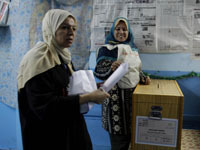Egyptians line up for first elections since Mubarak's fall
 Queues have formed at many polling stations as Egyptians vote in the first elections since former President Hosni Mubarak was toppled in February.
Queues have formed at many polling stations as Egyptians vote in the first elections since former President Hosni Mubarak was toppled in February.
People lined up early in many places but there are also reports of polling stations opening late because of administrative problems. At the same time, Cairo's Tahrir Square is still occupied by protesters who want the poll to be postponed.The head of the ruling military council has said Egypt is "at a crossroads", says BBC News.
The ballot has already has been marred by turmoil in the streets, and the population is sharply polarized and confused over the nation's direction.
Given the novelty of open elections in Egypt, even the security forces policing the polling stations were struggling to do their jobs within entirely new parameters. Palmer says Army officers grappling with the new concept of transparency weren't sure about allowing the CBS News crew to shoot video of actual voting. The commanding officer at the polling station, however, had been sent for a U.S. military training course in Alabama in the late 1990s, informs CBS News.
The Brotherhood entered the campaign armed with a powerful network of activists around the country and years of experience in political activity, even though it was banned under Mubarak's regime. Love them or hate them, Egyptians know them. That gave them what many see as an automatic leg up over liberal, leftist and secular parties, most of which are newly created after the Feb. 11 fall of Mubarak, are not widely known among the public and were plagued by divisions through the past months.But also weighing heavily on voters' mind was the question of whether this election will really set Egypt on a path of democracy amid the stormy politics of the past months under the rule of the military, which took power after Mubarak's fall, according to Washington Post.
Egypt now has about 50 political parties, double the number before Mubarak's fall. Some 590 party lists and 6,591 independents will contest the seats of the People's Assembly. Some 272 party lists and 2,036 independents will contest the seats at the Shura Council, the upper house of the parliament. Each party list has four to eight candidates.The parliamentary polls are supposed to help shape the political landscape of the country. Hussein Tantawi, head of the ruling military council, on Sunday called citizens to cast votes, reports Xinhua.
Subscribe to Pravda.Ru Telegram channel, Facebook, RSS!





